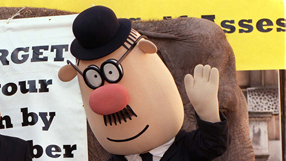League clubs criticised for huge tax debts

Business dealings of Football League clubs could soon come under the microscope to avoid them running up crippling tax bills – which, under current FA and League rules, remain the last to be paid when clubs are strapped for cash.
According to chairman Lord Mawhinney, the League is considering proposals to press the clubs for more detailed financial information. Club chairmen could be deliberating the plans next year, Lord Mawhinney told the BBC’s File On 4 programme.
“We’re looking at whether we should put in place arrangements that require clubs to give more information about their finances,” said Lord Mawhinney.
Several chairmen have said that clubs running up huge tax debts are effectively bankrolled by HM Revenue and Customs. Although HMRC is frequently the creditor most out of pocket, under League and FA rules it is not considered a “priority creditor” like players or other clubs.
There have been reports suggesting that between 50 and 60 clubs in the Football League and Football Conference had racked up a £50m tax bill – which will surely come under Governmental scrutiny during the current credit crunch.
“Football clubs are facing more scrutiny than ever before from tax inspectors,” says Frank Goldberg, senior manager at BDO Stoy Hayward. “HM Revenue and Customs is increasingly looking into the affairs of clubs and not just those in the Premiership. Failure to submit the required returns and make the correct payments on time is increasingly leading to legal proceedings being brought against the relevant club."
With clubs owing millions in income tax and National Insurance, and Gordon Brown and David Cameron attempting to court public opinion over, football is also risking a major backlash from its own constituents – the customers who hand over their hard-earned at the turnstile.
Get FourFourTwo Newsletter
The best features, fun and footballing quizzes, straight to your inbox every week.
“We have recently come across clubs funding working capital by not paying their PAYE, National Insurance or VAT to HMRC," continues Goldberg. "With the recent financial crisis many clubs may find fans staying away from matches, causing a reduction in gate receipts."
Luton Town owner Gary Sweet, whose club owed £2.5m in taxes when he took it over, is amazed that HMRC allowed such debt to escalate. “I’d like to know exactly what the Revenue’s stance is in moving forward with football clubs and football businesses because I think that position is wholly disastrous for football,” he said.
“It’s the population that is subsidising football clubs – and that’s wrong, not just for the taxpayer but also for the football club, which shouldn’t be permitted to get into deep waters like that.”
According to Andrew Fitton, whose consortium took over Swindon Town last December, HMRC was effectively the bank of football. When Fitton’s consortium took over Swindon, now sponsored by FourFourTwo, the club owed millions in unpaid taxes.
“The person who did due diligence for me said, when he presented the report, ‘That’s your bank [HMRC]’. He was right: they were the bank, they were the major creditor. There was no money owed to the bank, it was owed to Revenue and Customs.”
Goldberg warns that HMRC won't take kindly to any clubs found treating it in such a fashion. "HMRC has never accepted that defaulting on taxes is an appropriate way to manage a club’s cash flow and it takes a dim view of those who do. Clubs with even the slightest concerns should seek expert advice.”
Lord Mawhinney says that in order to prevent clubs trying to build up large unpaid tax bills, the Football League may introduce rules – which may be a difficult pill to swallow for chairmen. “Of course, the clubs would have to vote on that,” he said. “But as a former health minister I’m a great believer that prevention is better than cure.”
For more on this story, Listen to BBC Radio 4’s File On 4 at 2000 GMT on Tuesday November 11, repeated Sunday November 16 a
Gary Parkinson is a freelance writer, editor, trainer, muso, singer, actor and coach. He spent 14 years at FourFourTwo as the Global Digital Editor and continues to regularly contribute to the magazine and website, including major features on Euro 96, Subbuteo, Robert Maxwell and the inside story of Liverpool's 1990 title win. He is also a Bolton Wanderers fan.
